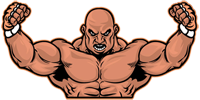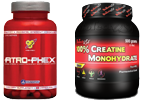|
| Subiectul anterior :: Subiectul urmator |
| Autor |
Mesaj |
ShaDoZ
Medic


Data inscrierii: 10/Ian/2012
Mesaje: 1059
Locatie: Timisoara
|
 Trimis: Mar Ian 24, 2012 7:17 pm Titlul subiectului: How muscles work Trimis: Mar Ian 24, 2012 7:17 pm Titlul subiectului: How muscles work |
 |
|
Muscles are one of those things that most of us take completely for granted, but they are incredibly important for two key reasons:
Muscles are the "engine" that your body uses to propel itself. Although they work differently than a car engine or an electric motor, they do the same thing -- they turn energy into motion.
It would be impossible for you to do anything without your muscles. Absolutely everything that you conceive of with your brain is expressed as muscular motion. The only ways for you to express any idea are with the muscles of your larynx, mouth and tongue (spoken words), with the muscles of your fingers (written words or "talking with your hands"), or with the skeletal muscles (body language, dancing, running, building or fighting, to name a few).
Because muscles are so crucial to any animal, they are incredibly sophisticated. They are efficient at turning fuel into motion, they are long-lasting, they are self-healing and they are able to grow stronger with practice. They do everything from allowing you to walk to keeping your blood flowing.
In this edition of HowStuffWorks, we will look at the different types of muscles in your body and the amazing technology that allows them to work so well.
Types of Muscle
When most people think of "muscles," they think about the muscles that we can see. For example, most of us know about the biceps muscles in our arms. But there are three unique kinds of muscle in any mammal's body:
Skeletal muscle is the type of muscle that we can see and feel. When a body builder works out to increase muscle mass, skeletal muscle is what is being exercised. Skeletal muscles attach to the skeleton and come in pairs -- one muscle to move the bone in one direction and another to move it back the other way. These muscles usually contract voluntarily, meaning that you think about contracting them and your nervous system tells them to do so. They can do a short, single contraction (twitch) or a long, sustained contraction (tetanus).
Smooth muscle is found in your digestive system, blood vessels, bladder, airways and, in a female, the uterus. Smooth muscle has the ability to stretch and maintain tension for long periods of time. It contracts involuntary, meaning that you do not have to think about contracting them because your nervous system controls them automatically. For example, your stomach and intestines do their muscular thing all day long, and, for the most part, you never know what's going on in there.
Cardiac muscle is found only in your heart, and its big features are endurance and consistency. It can stretch in a limited way, like smooth muscle, and contract with the force of a skeletal muscle. It is a twitch muscle only and contracts involuntarily.
In this article, we will focus on skeletal muscle. The basic molecular processes are the same in all three types.
Inside a Muscle Cell
Skeletal muscle is also called striated muscle, because when it is viewed under polarized light or stained with an indicator, you can see alternating stripes of light and dark.
Cross section of a skeletal muscle (200x) showing the muscle fibers (red) and the fat cells (white)
Skeletal muscle has a complex structure that is essential to how it contracts. We will tease apart a skeletal muscle, starting from the largest structures and working our way to the smaller ones.
Parts of a skeletal-muscle fiber
Parts of a Skeletal-muscle Fiber
The basic action of any muscle is contraction. For example, when you think about moving your arm using your biceps muscle, your brain sends a signal down a nerve cell telling your biceps muscle to contract. The amount of force that the muscle creates varies -- the muscle can contract a little or a lot depending on the signal that the nerve sends. All that any muscle can do is create contraction force.
A muscle is a bundle of many cells called fibers. You can think of muscle fibers as long cylinders, and compared to other cells in your body, muscle fibers are quite big. They are from about 1 to 40 microns long and 10 to 100 microns in diameter. For comparison, a strand of hair is about 100 microns in diameter, and a typical cell in your body is about 10 microns in diameter.
A muscle fiber contains many myofibrils, which are cylinders of muscle proteins. These proteins allow a muscle cell to contract. Myofibrils contain two types of filaments that run along the long axis of the fiber, and these filaments are arranged in hexagonal patterns. There are thick and thin filaments. Each thick filament is surrounded by six thin filaments.
Thick and thin filaments are attached to another structure called the Z-disk or Z-line, which runs perpendicular to the long axis of the fiber (the myofibril that runs from one Z-line to another is called a sarcomere). Running vertically down the Z-line is a small tube called the transverse or T-tubule, which is actually part of the cell membrane that extends deep inside the fiber. Inside the fiber, stretching along the long axis between T-tubules, is a membrane system called the sarcoplasmic reticulum, which stores and releases the calcium ions that trigger muscle contraction.
|
|
|
| Sus |
|
 |
AdBot
Robotelul cu reclame

Sus
|
|
 |
Delincvent
Membru


Data inscrierii: 10/Ian/2012
Mesaje: 146
Locatie: Gurghiu, jud.Mures
|
 Trimis: Mar Ian 24, 2012 11:23 pm Titlul subiectului: Re: How muscles work Trimis: Mar Ian 24, 2012 11:23 pm Titlul subiectului: Re: How muscles work |
 |
|
Totusi, ar fi mai ok in limba romana oficiala a forumului 
|
|
|
| Sus |
|
 |
ShaDoZ
Medic


Data inscrierii: 10/Ian/2012
Mesaje: 1059
Locatie: Timisoara
|
 Trimis: Mie Ian 25, 2012 10:24 am Titlul subiectului: Trimis: Mie Ian 25, 2012 10:24 am Titlul subiectului: |
 |
|
bine bine dar nu trebuie sa scrii chestia asta la fiecare articol pus de mine in engleza...in plus nu ar strica nimanui nitel de exercitiu in engleza... :wink:
|
|
|
| Sus |
|
 |
|

|
Nu puteti crea un subiect nou in acest forum
Nu puteti raspunde in subiectele acestui forum
Nu puteti modifica mesajele proprii din acest forum
Nu puteti sterge mesajele proprii din acest forum
Nu puteti vota in chestionarele din acest forum
|
|



